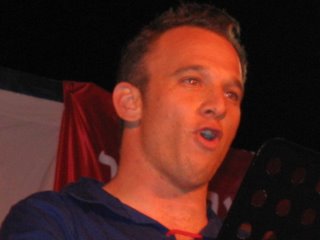
Limmud Day 2-Saturday
I woke up early to try plan ahead, after Shabbat, certain time slots would have a choice of 20 slots, I was taking this seriously, I could not make slip ups, despite my pre-emptive pre-planning preciseness I could not get beyond Sunday evening. This process was frustrating; before I left for Limmud I had decided who I wanted to see but many of these speakers sessions always clashed.
One of the great things about Limmud is that everyone wears badges with your name, and the place you hail from These are also colour-coded i.e. red is for volunteers. Certain people were wearing green Shabbat-Only” badges which did not give your name or residence, as one of those who donned the green-badge said, he felt like an “outcast”, he felt as if he was at the “bottom of the hierarchy”.
The first session I went to was by Paul Liptz, I had heard Paul twice before, on separate visits to Israel, a former member of Habonim in the then-Rhodesia, Paul gave a talk on “The Heavy Load of History-Jews in the 21st Century. He was supposed to look at the Holocaust and the creation of the State of Israel as two examples of the most dramatic events for the Jewish people in the 20th century and then look forward to what the 21st century held for them.
He did not really stick to his topic, but his charming nature and his insight of the points he veered to made it an interesting talk. I had been to 3 talks and not one was bad. I was off to a great start.
It got better, after lunch, I went to Ruvik Rosenthal, one of Israel’s top journalists and commentators on the Hebrew language, This session was very well attended. There he was sitting slouched in his chair with his legs crossed and his hands folded dressed like an archetypal professor with a wry smile. It was about “The Fate of the Yekkes”, Rosenthal gave a deeply personal account about his own family who had moved from Germany to Palestine. He read extracts from his novel Blumenstrasse 22. It was fascinating to hear how the German’s dealt with the move and how they interacted with the other immigrants, but yet also tragic as Rosenthal told the stories of his own family.
I realised that a thread was developing, all the lectures I had been to thus far were all presented by Israelis, I decided to an about turn, the next session I attended was entitled the Dying Musical Traditions of the Anglo-Jewish Chazzanos “-the title is no joke. It was given by a bow-tied sartorial Mark Daniels, Daniels explained and sang to us many of the tunes which were sadly dying out from our synagogues. I don’t think I would ever attend such a session beyond the trees of Nottingham University, but I learned something new, although I still cant sing.
After doing some volunteering, I attended a late night session on “The End of Aliyah”, given by Einat Wilf. Playing devil’s advocate and suggesting interesting ideas for Israel and Jewish communities across the world to interact with one another, Wilf had some interesting exchanges with Jewish Agency madrichim, loonies, and Post-Zionists. I had quite a few exchanges with her to explain my convoluted thinking of where Aliyah was heading and what kind of Olim Israel needed.
They had opened the EMCC (East Midlands Conference Centre), this was the hub of the conference, this had the main venues, pub, shuk, tuckshop, offices etc. Many people started arriving for Limmud on Saturday night, and the Limmud experience was about to be transformed from a small Shabbat community to a conference of over 2,300 people.
_____________
The photo is a side angle of Ruvik Rosenthal


0 Comments:
Post a Comment
<< Home